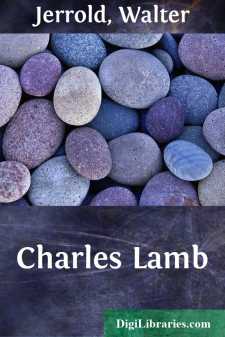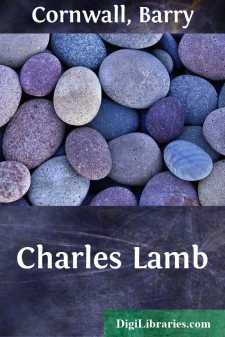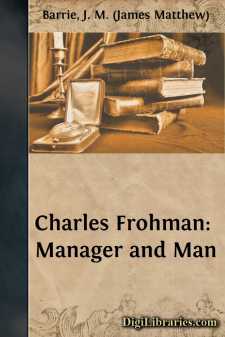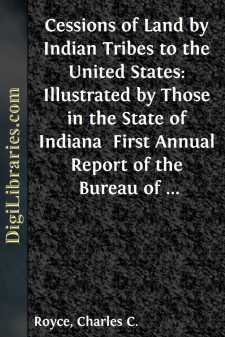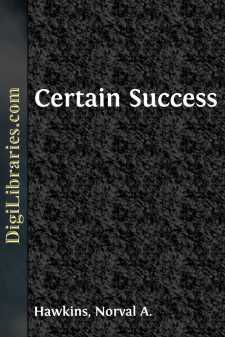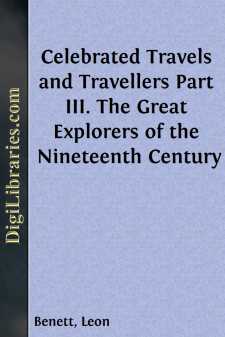Non-Classifiable
- Non-Classifiable 1768
Non-Classifiable Books
Sort by:
by:
Walter Jerrold
CHARLES LAMB THE STORY OF HIS LIFE Charles Lamb's biography should be read at length in his essays and his letters—from them we get to know not only the facts of his life but almost insensibly we get a knowledge of the man himself such as cannot be conveyed in any brief summary. He is as a friend, a loved friend, whom it seems almost sacrilegious to summarize in the compact sentences of a...
more...
by:
Barry Cornwall
The biography of CHARLES LAMB lies within a narrow compass. It comprehends only few events. His birth and parentage, and domestic sorrows; his acquaintance with remarkable men; his thoughts and habits; and his migrations from one home to another,—constitute the sum and substance of his almost uneventful history. It is a history with one event, predominant. For this reason, and because I, in common...
more...
Charles Frohman:an Appreciation By James M. Barrie The man who never broke his word. There was a great deal more to him, but every one in any land who has had dealings with Charles Frohman will sign that. I would rather say a word of the qualities that to his friends were his great adornment than about his colossal enterprises or the energy with which he heaved them into being; his energy that was like...
more...
INTRODUCTION. Charles Carleton Coffin had a face that helped one to believe in God. His whole life was an evidence of Christianity. His was a genial, sunny soul that cheered you. He was an originator and an organizer of happiness. He had no ambition to be rich. His investments were in giving others a start and helping them to win success and joy. He was a soldier of the pen and a knight of truth. He...
more...
CHARACTER SKETCHES OF ROMANCE, FICTION, AND THE DRAMA. Mark Tapley, a serving companion of Martin Chuzzlewit, who goes out with him to Eden, in North America. Mark Tapley thinks there is no credit in being jolly in easy circumstances; but when in Eden he found every discomfort, lost all his money, was swindled by every one, and was almost killed by fevers, then indeed he felt it would be a real credit...
more...
by:
Charles C. Royce
CHARACTER OF THE INDIAN TITLE. The social and political relations that have existed and still continue between the Government of the United States and the several Indian tribes occupying territory within its geographical limits are, in many respects, peculiar. The unprecedentedly rapid increase and expansion of the white population of the country, bringing into action corresponding necessities for the...
more...
CHAPTER I The Universal Need For Sales Knowledge Analysis of Secret of Certain SuccessThe Secret of Certain Success has four principal elements. It comprises: (1) Knowing how to sell (2) The true idea (3) Of one's best capabilities (4) In the right market or field of service. Your success will be in direct proportion to your thorough knowledge and continual use of all four parts of the whole...
more...
CERTAIN PERSONAL MATTERS THOUGHTS ON CHEAPNESS AND MY AUNT CHARLOTTE The world mends. In my younger days people believed in mahogany; some of my readers will remember it—a heavy, shining substance, having a singularly close resemblance to raw liver, exceedingly heavy to move, and esteemed on one or other count the noblest of all woods. Such of us as were very poor and had no mahogany pretended to...
more...
by:
Leon Benett
CHAPTER I.THE DAWN OF A CENTURY OF DISCOVERY.Slackness of discovery during the struggles of the Republic and Empire—Seetzen's voyages in Syria and Palestine—Hauran and the circumnavigation of the Dead Sea—Decapolis—Journey in Arabia—Burckhardt in Syria—Expeditions in Nubia upon the two branches of the Nile—Pilgrimage to Mecca and Medina—The English in India—Webb at the Source of...
more...
by:
Leon Benett
CHAPTER I.I.C.Cassini—Picard and La Hire—The arc of the Meridian and the Map of France—G. Delisle and D'Anville—The Shape of the Earth—Maupertuis in Lapland—Condamine at the Equator. Before we enter upon a recital of the great expeditions of the eighteenth century, we shall do well to chronicle the immense progress made during that period by the sciences. They rectified a crowd of...
more...


